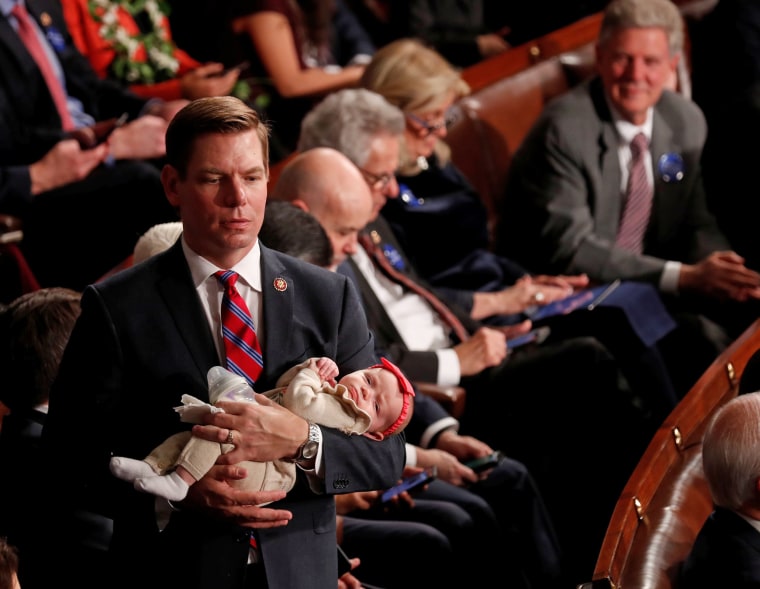For all the dusty policy papers we read and all the hearings we hold on Capitol Hill, there’s no place better to learn about the American health care system — its strengths, and its immense shortcomings — than in a hospital, among the afflicted and their families.
You can particularly learn a lot by sleeping a few nights in your infant daughter’s hospital room — and I did, when our Cricket spent three days in a children’s hospital ICU recently while suffering from a respiratory virus. It was a scary, strained couple of days; she’s fine now.
What I saw there cemented what I’d already come to believe: We need a Medicare for All universal health guarantee. We need, and Americans deserve, a health care system in which if you get sick you get seen, as well as one in which if you get seen, you don’t go broke because of it.
The rest of the industrialized world figured this out long ago; it’s past time that we catch up.
Now, the care that Cricket received was excellent, and our family is among the very lucky because we have solid health insurance thorough my wife’s job that covered almost everything. (Yes, that’s right – our family is on my wife’s insurance, which is better than what’s offered to me as a Member of Congress.) So, we were free to agonize only over our daughter’s health, not what it would cost us.
Yet it shouldn’t be a matter of luck or employment. My wife, Brittany, and I talked to too many other parents in that hospital who knew that, as soon as they were done praying for their kids’ recovery, they would start praying for some sort of deliverance from the avalanche of bills that would surely put them in debt for a long time.
We saw one gravely ill girl whose parents never seemed to be at her bedside. It turns out that her parents desperately wanted to be there, but couldn’t miss work – we’re not sure if they couldn’t afford to take unpaid time off, or if they didn’t work for an employer covered by the Family and Medical Leave Act.
It made me think more about what then-congressional candidate J.D. Scholten showed me while I was campaigning with him in Western Iowa last year: Empty candy jars placed on convenience store counters all over the district, each with a flyer pleading for passersby to help some ailing local resident pay for critical medical care. “We're America, the wealthiest country in the world. That doesn't feel American,” J.D. said.
I agree: Our health — our children’s health — cannot be a commodity subject to market forces, and a poor child’s fate must not depend on the charity of others.
And beyond the immediate costs, we were struck during our hospital stay by the tragedy of so many children facing cancer or rare diseases with little hope — any parent’s worst nightmare. We entered the hospital with a reasonable expectation (despite our fear) that we’d be taking Cricket home afterward. Too many families don’t have that solace, and can see nothing ahead except pain, loss, grief and then debt.
Among President Trump’s guests at his State of the Union this year was 10-year-old Grace Eline of New Jersey, whose story he shared. Grace had told her friends for years that, instead of birthday gifts to her, they should donate to St. Jude’s Children’s Research Hospital. Much later, after she herself was diagnosed with brain cancer and undergoing radiation treatment and chemotherapy, she helped raise more than $40,000 for the Valerie Fund, a nonprofit that provides psychosocial care for children with cancer. The president told us that he would ask Congress for $500 million over the next 10 years to fund cancer research.
Grace has a big heart, and she is indeed an inspiration. But this story’s subtext is that providing services, be they radiation treatment, chemotherapy or psychosocial care, to American children with cancer is a matter of charity — just like those candy jars on the Iowa convenience store counters — and the president’s proposal fails to rise to the challenge.
We need to invest in finding cures in our lifetime to our most insidious diseases, from ALS and Alzheimer’s to cancer and cystic fibrosis. We can achieve this, in part, by increasing funding for the National Institutes of Health and giving them long-term certainty of their budget.
We are the most technologically advanced society in history. If we can put a probe on Mars or put online orders on your doorstep within hours, surely we can harness our unparalleled innovative spirit to prolong and better our lives while creating thousands of new jobs in the life sciences.
The president proposes spending $50 million per year to fund cancer research, but he proposed a $4.407 trillion federal budget for this fiscal year. We should invest more than .00001 of the federal budget to help save our own lives.
And then we need to admit that the only way for those cures we will discover to get to all the Americans who need them is to pass a universal health guarantee, like Medicare for All.
We’ve only nibbled around the edges of the problem of truly affordable health care for decades while more and more Americans have had to choose between paying for a doctor’s visit or paying the rent, or between buying medicine or buying food. That’s appalling.
So, no more half-steps. Let's pass coverage for all today, and spend money to make sure there are cures for all tomorrow. Ponder your own child’s precious health, and then let’s go big, be bold and do good for all of our children, and their children, too.




